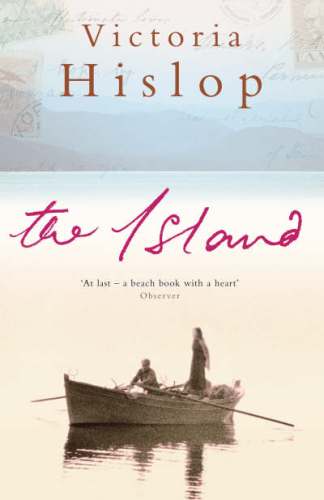As I mentioned on Friday, throughout September I’m going to be reviewing books by writers appearing at Jersey Festival of Words at the end of the month. I’ve divided my reading by theme and this week I’m focusing on Historical Fiction. I confess that I started here as it’s probably my least favourite genre (I make an exception for Hilary Mantel) but I’ve been pleasantly surprised by books I probably wouldn’t have picked up otherwise.

The Island was Victoria Hislop’s debut novel, published in 2005.The story is framed by events in 2001 in which a young woman, Alexis, travels to Plaka on the island of Crete searching for clues about her mother’s past and a childhood that is never discussed. There she meets Fotini Davaras, an old friend of her mother’s, who tells her the family’s story.
The story, which takes place between 1939 and 1958, centres around life on the island opposite Plaka, the island of Spinalonga. Alexis guidebook tells her:
SPINALONGA: Dominated by a massive Venetian fortress, this island was seized by the Turks in the eighteenth century. The majority of Turks left Crete when it was declared autonomous in 1898 but the inhabitants refused to give up their homes and their lucrative smuggling trade on Spinalonga. They only left in 1903 when the island was turned into a leper colony. In 1941, Crete was invaded by the Germans and occupied until 1945, but the presence of lepers meant Spinalonga was left alone. Abandoned in 1957.
What the guidebook doesn’t tell her is that in 1939, Eleni, her great-grandmother, ‘left the mainland for Spinalonga’. One of her pupils, nine-year-old Dimitri, also went. His parents having covered the blemishes on his skin for over a year, until Eleni ‘noticed the strange patches on the back of her leg’.
As Georgiou takes Eleni and Dimitri to Spinalonga on the boat in which he makes regular trips to the island with supplies, Eleni contemplates her situation:
As the boat neared the island, Eleni held Dimitri’s hand ever more tightly. She was glad that this poor boy would have someone to care for him and at this moment did not give a second thought to the irony of this position. She would teach him and nurture him as though he were her own son, and do her best to ensure that his schooling was not cut short by this terrible turn of events.

They (and no doubt the reader) are pleasantly surprised when they disembark at Spinalonga to discover ‘It looked just like market day in Plaka’. Eleni also quickly establishes: What had always been rumoured was true. Most of the lepers looked as she did: ostensibly unblemished.
Spinalonga has its own democracy with an elected leader, shops, a church, a town hall, a school, a market and a clinic. As Eleni and Dimitri begin to organise their new life, Georgiou is dealing with the loss of his wife and raising two daughters, twelve-year-old Anna and ten-year-old Maria, alone.
As the girls grow up, the story develops into a tale of a difficult sibling relationship. Maria is kind and tries to help her father, while Anna is tempestuous and selfish, her behaviour ultimately becoming destructive.
Hislop explores a place and a condition that it is rarely talked about. She does an excellent job of exploding myths about leprosy while covering the advances in treatment that took place during the time the novel is set. Her descriptions of life on Spinalonga are fascinating and when she spent a period of time back in Plaka, I was always keen to return to events on the island.
There are a couple of weak point in the novel. The framing device set in the recent past is just that: we barely get to know Alexis and her boyfriend troubles are irritating but mercifully short-lived. While the point in the story where a mob comes to Plaka intent on razing the island to the ground lacks the tension to make you believe the inhabitants of Spinalonga were ever really in danger. Having said that, on the whole I found The Island an engaging, interesting, knowledgeable read. I loved that while it was clearly plot-driven, it took a challenging subject and gave the reader a viewpoint different to that of the mainstream.
Victoria Hislop appears at Jersey Arts Centre at 8.30pm, Thursday 29th September. Tickets are available here.

While historical fiction isn’t my favourite genre either, I did enjoy this novel when I read it for book group. You’ve done a great job of capturing the book’s strengths and limitations – I found it quite insightful too, especially in relation to the island’s history.
LikeLike
Thanks, Jacqui. It is interesting to read outside of your comfort zone occasionally, isn’t it? And like you, I found it insightful. It’s nice to read a book dealing with a lesser know history.
LikeLike
Pingback: Jersey Festival of Words: Day One | The Writes of Woman